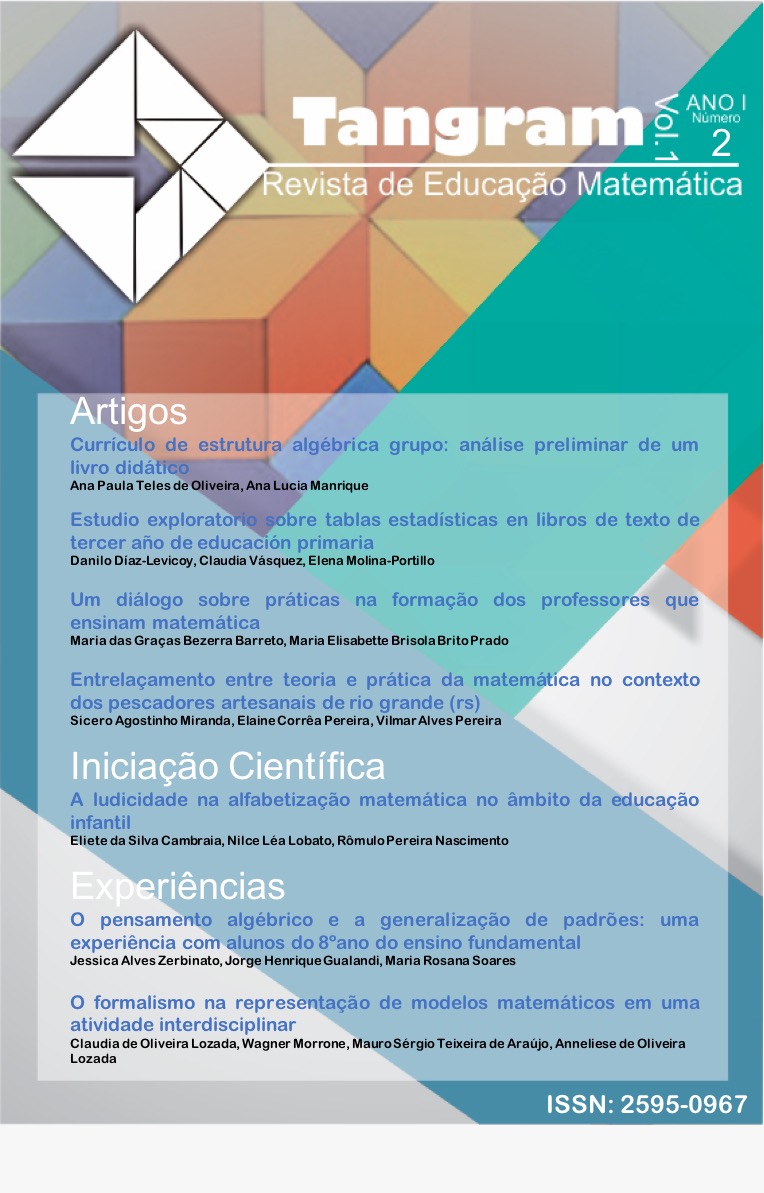O pensamento algébrico e a generalização de padrões: uma experiência com alunos do 8ºano do ensino fundamental
DOI:
https://doi.org/10.30612/tangram.v1i2.7343Abstract
Este artigo apresenta um estudo com alunos do 8º ano do ensino fundamental, realizado em uma escola municipal de Cachoeiro de Itapemirim/ES. O estudo objetivou investigar a compreensão dos alunos na realização de atividades envolvendo Generalização de Padrões, o que se deu por meio de duas atividades investigativas. A primeira teve o propósito de diagnosticar as dificuldades dos alunos, para, a partir de sua correção, apresentar formas de resolução dessas atividades. A segunda atividade teve o propósito de analisar os resultados. Os resultados apontaram que a atividade envolvendo a Generalização de Padrões possibilitou aos alunos ter contato com um aspecto da álgebra que é essencial para o seu desenvolvimento cognitivo, que até então não tinham conhecimento. Por meio das atividades utilizadas, os sujeitos puderam desenvolver as habilidades de observação, generalização e abstração.
Palavras-chave: Generalização de Padrões. Pensamento Algébrico. Processo Ensino-Aprendizagem.
Downloads
References
- REFERÊNCIAS
BRASIL. SECRETARIA DE EDUCAÇÃO FUNDAMENTAL. Parâmetros Curriculares Nacionais: Matemática: terceiro e quarto ciclos. Brasília: MEC/SEF, 1998.
DREYFUS, T. Advanced mathematical thinking processes. In: TALL, D. (Ed.). Advanced mathematical thinking. Dordrecht: Kluwer, 2002, p. 25-41
FIORENTINI, Dario & LORENZATO, Sérgio. Investigação em Educação Matemática: percursos teórico e metodológico. 3.ed. Campinas: Autores Associados, 2012 (Coleção Formação do Professor).
MESTRE, C., OLIVEIRA, H. (2011). O pensamento algébrico e a capacidade de generalização de alunos do 3.º ano de escolaridade do ensino básico. In C. Guimarães & P. Reis (Orgs.). Professores e Infâncias: Estudos e experiências (pp. 201-223). São Paulo: Junqueira & Marin Editores.
NOVA ESCOLA. Generalizações e cálculos algébricos.
Disponível em: <http://rede.novaescolaclube.org.br/planos-de-aula/generalizacoes-e-calculos-algebricos>. Acesso em: 06 abr. 2015
PONTE, João Pedro da. Investigações matemáticas na sala de aula. Belo Horizonte: Autêntica Editora, 2009.
SANTOS, Adriana Tiago dos, BIANCHINI Barbara Lutaif. Análise das estratégias utilizadas pelos estudantes no estudo de funções logarítmicas e exponenciais, 2012. Disponível em: <http://sites.unifra.br/Portals/35/Artigos/2012/03.pdf> Acesso em: 28 out. 2015
Downloads
Published
How to Cite
Issue
Section
License
Authors must accept the publication rules when submitting the journal, as well as agree to the following terms:
(a) The Editorial Board reserves the right to make changes to the Portuguese language in the originals to maintain the cultured standard of the language, while respecting the style of the authors.
(b) Authors retain the copyright and grant the journal the right to first publication, with the work simultaneously licensed under the Attribution-NonCommercial-ShareAlike 3.0 Brazil (CC BY-NC-SA 3.0 BR) that allows: Share - copy and redistribute the material in any medium or format and Adapt - remix, transform, and create from the material. CC BY-NC-SA 3.0 BR considers the following terms:
- Attribution - You must give the appropriate credit, provide a link to the license and indicate whether changes have been made. You must do so under any reasonable circumstances, but in no way that would suggest that the licensor supports you or your use.
- NonCommercial - You may not use the material for commercial purposes.
- Sharing - If you remix, transform, or create from material, you must distribute your contributions under the same license as the original.
- No additional restrictions - You may not apply legal terms or technological measures that legally restrict others from doing anything that the license permits.
(c) After publication, authors are allowed and encouraged to publish and distribute their work online - in institutional repositories, personal page, social network or other scientific dissemination sites, as long as the publication is not for commercial purposes.






